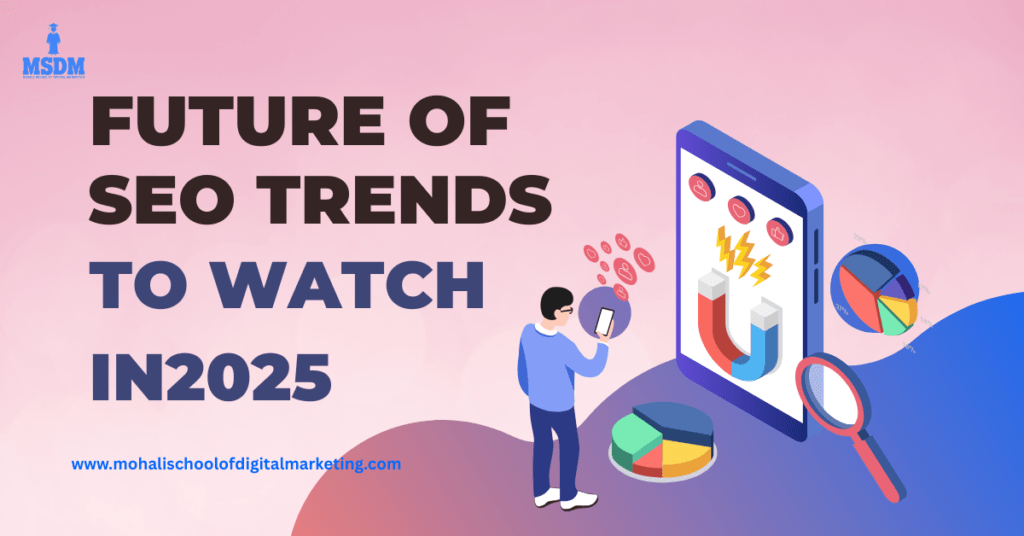Introduction
Search Engine Optimization (SEO) is constantly evolving, driven by Google’s algorithm updates, user behavior changes, and advancements in artificial intelligence. As we move into 2025, businesses and marketers must stay ahead of emerging trends to maintain their online visibility. In this blog, we’ll explore the future of SEO, key trends shaping the industry, and how to adapt your strategies for long-term success.
1. AI and Machine Learning Will Dominate SEO
Artificial Intelligence (AI) has already revolutionized digital marketing, and in 2025, its influence on SEO will be stronger than ever. Google’s AI-powered algorithm, RankBrain, plays a crucial role in understanding search intent and delivering personalized results. With AI advancements, search engines will become even smarter at predicting user preferences.
What You Can Do:
•Use AI-powered tools like ChatGPT, Surfer SEO, and Clearscope to optimize content.
•Focus on search intent rather than just keywords.
•Implement AI-driven chatbots to enhance user engagement.
2. Voice Search Optimization Will Be Essential
With the rise of smart assistants like Siri, Alexa, and Google Assistant, voice search is becoming a dominant force in SEO. By 2025, it’s expected that over 50% of searches will be voice-based. Voice queries tend to be longer and more conversational compared to text-based searches.
What You Can Do:
•Optimize content for long-tail keywords and question-based searches (e.g., “What is the future of SEO?”).
•Improve website speed and mobile responsiveness.
•Create FAQ pages that answer common user questions concisely.
3. Google’s Core Web Vitals Will Be More Important
Google’s Core Web Vitals—which include page speed, interactivity, and visual stability—have been ranking factors for a while. In 2025, Google will place even more emphasis on user experience (UX) as a ranking factor.
What You Can Do:
•Improve your website’s loading speed by compressing images and minimizing unnecessary code.
•Ensure a smooth and seamless mobile experience.
•Avoid intrusive pop-ups that negatively impact user experience.
4. Zero-Click Searches Will Continue to Rise
A zero-click search occurs when users find answers directly on the search results page (SERP) without clicking any links. This is due to Google’s featured snippets, knowledge graphs, and “People Also Ask” sections. By 2025, zero-click searches will become even more prevalent.
What You Can Do:
•Optimize for featured snippets by structuring content with clear headings and bullet points.
•Provide direct, concise answers to common search queries.
•Implement structured data (schema markup) to help search engines understand your content better.
5. Video Content Will Dominate Search Rankings
Videos have already become a key part of SEO, and in 2025, they will be even more critical. Google increasingly prioritizes video content, especially YouTube videos, in search results. Short-form videos on platforms like Instagram Reels and TikTok are also influencing search visibility.
What You Can Do:
•Optimize video titles, descriptions, and tags with relevant keywords.
•Add transcripts and captions to make your videos accessible.
•Embed videos within blog posts to increase dwell time on your website.
6. E-E-A-T (Experience, Expertise, Authoritativeness, Trustworthiness) Will Be Crucial
Google’s E-E-A-T (Experience, Expertise, Authoritativeness, Trustworthiness) framework will play a larger role in ranking websites in 2025. Search engines favor content from credible and authoritative sources, particularly in YMYL (Your Money, Your Life) niches like health, finance, and law.
What You Can Do:
•Showcase author expertise with detailed author bios.
•Get backlinks from reputable sources.
•Ensure your content is accurate, up-to-date, and well-researched.
7. Mobile-First Indexing Will Be the Standard
Google has been pushing mobile-first indexing, meaning it primarily uses the mobile version of a website for ranking and indexing. In 2025, a mobile-optimized website is no longer optional—it’s mandatory.
What You Can Do:
•Use a responsive web design that adapts to different screen sizes.
•Optimize images and reduce unnecessary elements to improve mobile performance.
•Ensure easy navigation and avoid intrusive interstitials (pop-ups).
8. Local SEO and Hyper-Personalization Will Grow
As more searches become location-specific, local SEO will continue to be a major ranking factor. Google’s personalized search results will tailor content based on user preferences, location, and previous search history.
What You Can Do:
•Optimize your Google My Business profile.
•Get more customer reviews and respond to them.
•Use location-specific keywords in your content.
Conclusion
The future of SEO in 2025 will be shaped by AI advancements, voice search, video content, mobile-first indexing, and a greater focus on user experience. To stay ahead, businesses and marketers must adapt to these evolving trends. By optimizing for AI, improving website speed, and creating high-quality, authoritative content, you can ensure your website remains competitive in search rankings.
Are you ready for the future of SEO? Start implementing these strategies today to stay ahead of the competition!

